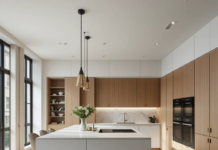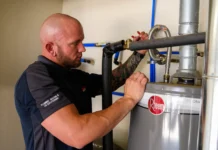Last Updated on February 25, 2026 by Rida Gul

Source: archello.com
Modular homes are a rising trend in the housing market, and for a good reason. They’re constructed in a controlled factory setting and offer you a lot of benefits. In contrast with traditional homes, modular contemporary homes are cost-effective, energy-efficient, and quick to build. Not to mention, they have a smaller carbon footprint than site-built homes.
These modern houses are available in a range of designs, allowing you to choose the most suitable one for you and your family. If you’re thinking about buying one of the modular modern style homes instead of a site-built one, take a look at the numerous advantages they have.
Table of Contents
What Are the Advantages of Modular Homes?
Cost-Efficient

Source: habitusliving.com
Although a lot of people already know the answer to this question – yes, modular homes are significantly cheaper than stick-built houses. Because modular homes are designed to be simple to install, the amount of labour you’ll need to purchase is reduced.
You’ll also benefit from pre-cut goods, no need for an architect, and everything being supplied on-site. This, too, saves money by making it easier to finish the project. These houses are typically 15% to 20% less expensive than a stick-built house.
Another way modular homes help you save money is by reducing the risk of third-party damage and theft. Laborers working on your construction site may steal building supplies and equipment.
Controlled Quality
Quality is one aspect of modular homes that has significantly improved. They aren’t like the obsolete prefab houses of the past. Each modular home is subjected to a thorough inspection. This means that you will enjoy excellent quality without worrying about it being only cosmetic.
The construction of modular houses is excellent. As a result, while they’re being transported, there are normally fewer zoning difficulties. The resale value of these homes significantly increases over time.
Modular homes are constructed according to the latest modern home trends. The designs of contemporary homes offered by modular construction companies include elements that are both high-quality and aesthetically pleasing. Manufacturers work with interior designers that carefully select each element in your new home – from the right flooring to the light fixtures.
Built Quickly
Building a traditional home might take up to seven months. On the other hand, modular houses are built with speed in mind, and that includes the actual construction process. Modular homes often reduce construction time by as much as 40% compared to traditional home construction methods. You should look into these modern homes if you need to build a house quickly.
Less Waste
One of the most significant advantages of modular homes is waste management. Because modular homes are manufactured in factories to exact specifications, there is no need for surplus material. This leads to huge reductions in construction waste. Prefabrication of trusses, frames and other components cuts the waste of new home plans by up to 52%.
Because modular homes are manufactured to strict specifications, they eliminate any waste on the construction site. Around 40% of landfill garbage is made up of repair and construction waste. Modular homes considerably reduce this, making them an excellent alternative for environmentally conscious homeowners. Not to mention, less material being sourced also means that the final cost of the project is significantly lower.

Source: solarmaxtech.com
Smaller Energy Bills
Modular houses cut a household’s energy usage by up to 70%. They often rely on solar power systems, which reduces the need for electricity from traditional grids. These homes also use low-energy light bulbs like LEDs or CFLs, since they are more energy-efficient and long-lasting.
Another thing that might help you save on energy expenses is the insulation in these houses. Some manufacturers construct their modular homes using high-performance weather-resistant wall underlays to create an airtight external wall membrane. This feature helps you easily achieve the optimal indoor temperature and rely less on heating and cooling systems – thus cutting down on energy bills.
Another reason why these self-sufficient modern homes are use less energy is because they often come with solar-based water heating systems. Solar-based water heating systems can meet most of a household’s hot water needs, reducing the amount of energy required for water heating. Additionally, by combining places that use water, such as the bathroom and kitchen, these homes experience less heat loss from pipes.
Modular Homes Are Healthier
Modular homes are frequently held to greater ecological standards than traditional homes, with an emphasis on clean and green energy and the use of non-toxic or low VOC (Volatile Organic Compounds) materials. These potentially harmful materials leak chemicals into the air and are known to have negative health effects. You will find them in several classic building and cleaning products such as PVC cement, refrigerator units, and some plywoods.
Some modular contemporary homes also come with pre-installed eco-features such as green or wildflower roofs.
What Are the Downsides of Modular Homes?

Source: yourhomeandgarden.co.nz
Although modular homes are a great living solution for a lot of reasons, they do have certain downsides. Here are a few things that you need to know before going the modular route:
- To begin, you’ll need to choose a suitable piece of land that is large enough (and of sufficient quality) for you to construct a traditional-style home on. This might be challenging, especially if you want to live near the city.
- Even though modular houses are a wonderful investment; lenders have a hard time financing them. Because they aren’t considered standard structures, you have to take extra procedures to get enough funds to make your modular home a reality.
- Another concern with modular homes is their slightly shorter lifespan. The majority of modular homes will survive between 30 and 100 years. This, however, largely depends on the materials chosen and how well they are cared for.
Despite these few disadvantages, modular houses are constantly evolving. This means that manufacturers keep finding innovative solutions for their customers’ problems. If you’re looking for a modern home design that is eco-friendly and practical, I suggest that you choose a modular one.
Read More: Modular Enclosure Solutions: Perfect For Every Industry.
if you want to know about Are Your Radiators then please visit our Home Improvement Category.



























